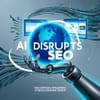The rise of artificial intelligence (AI) is transforming the way we interact with search engines, disrupting traditional Search Engine Optimization (SEO) strategies. AI-powered search engines are becoming increasingly adept at understanding natural language, context, and intent.
Google's BERT algorithm, introduced in 2018, marked a significant shift towards AI-driven search. BERT's natural language processing (NLP) capabilities enable it to better comprehend search queries, leading to more accurate results.
The impact of AI on SEO is profound. Keyword optimization is becoming less relevant, as AI-powered search engines focus on context, intent, and entity-based optimization. High-quality, engaging, and relevant content that addresses the user's query is now paramount.
Technical SEO remains essential, with page speed, mobile responsiveness, and structured data playing critical roles in search engine ranking. The rise of voice search and conversational AI also requires optimization strategies to adapt to these new interfaces.
Entity-based optimization is emerging as a key strategy, as AI-powered search engines focus on entities rather than just keywords. This shift requires SEO strategies to prioritize entity-based optimization, ensuring that businesses and marketers can thrive in this new AI-powered search landscape.
The AI-driven search revolution demands that businesses and marketers rethink their SEO approaches. By prioritizing high-quality content, technical optimization, and entity-based strategies, organizations can adapt to the changing search landscape and maintain their online visibility.


